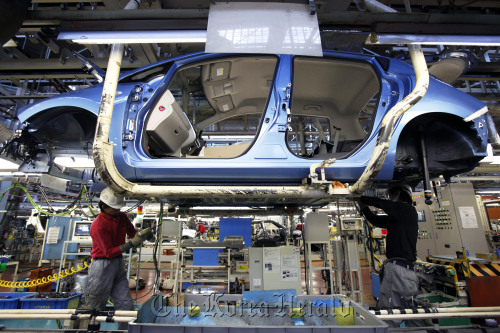Japan’s machinery orders rebounded in August on demand for electrical products, signaling that companies are willing to invest even as global economic growth slows and the yen stays near post-World War II highs.
Bookings rose 11 percent in August from July, the fastest increase in a year, the Cabinet Office said in Tokyo Wednesday. The indicator of capital spending in three to six months was projected to increase 3.9 percent, according to the median forecast of 31 economists surveyed by Bloomberg News. Orders fell 8.2 percent in July from June.
Wednesday’s report contrasts with data last month that undershot economist forecasts, including exports, industrial output and retail sales. A yen appreciation that Nissan Motor Co. chief executive officer Carlos Ghosn said last week may cause a “hollowing out” of Japan’s industrial base also threatens to derail a rebound in the nation’s economy.
 |
Nissan Motor Co. employees assemble a Leaf electric vehicle on the production line of the company’s Oppama plant in Yokosuka City, Japan. (Bloomberg) |
“Capital spending is maintaining a gradual recovery trend,” Akiyoshi Takumori, chief economist at Sumitomo Mitsui Asset Management Co. in Tokyo, said before the report. “The biggest concern from here is the strong yen. We have to see how that will affect corporate decisions for business investment.”
Japan’s currency, which has risen 5.8 percent so far this year against the dollar, touched a postwar high of 75.95 on Aug. 19. The yen traded at 76.71 per dollar at 9:47 a.m. in Tokyo, little changed from the level before the report.
Orders for electrical machinery jumped 29.5 percent in August from July, the Cabinet Office said.
Large companies plan to increase capital spending 3 percent in the year ending March 2012, less than economists forecasts for a 4.3 percent advance, the Bank of Japan’s Tankan report showed last week. (Bloomberg)
Goldman Sachs Group Inc. cut its forecast for Japan’s real economic growth during this fiscal year to 0.1 percent from 0.2 percent due to a slowdown in global expansion, it said this month.
“I expect Japan’s economy will have a big slowdown” after this quarter, said Ryutaro Kono, chief economist at BNP Paribas SA in Tokyo, said before the report.
To keep the recovery going, Prime Minister Yoshihiko Noda’s government is implementing measures to cope with the yen’s gains, including subsidies for companies. The ruling Democratic Party of Japan has proposed a 12 trillion yen ($156 billion) stimulus package to support the economy. (Bloomberg)








![[Today’s K-pop] Blackpink’s Jennie, Lisa invited to Coachella as solo acts](http://res.heraldm.com/phpwas/restmb_idxmake.php?idx=644&simg=/content/image/2024/11/21/20241121050099_0.jpg)